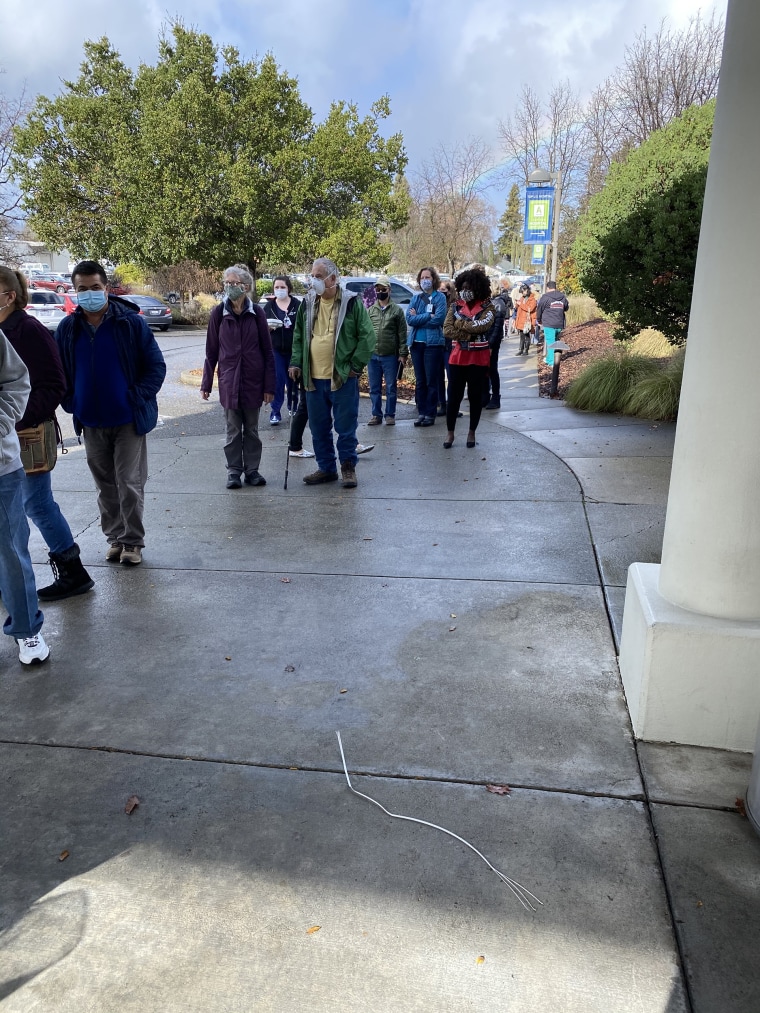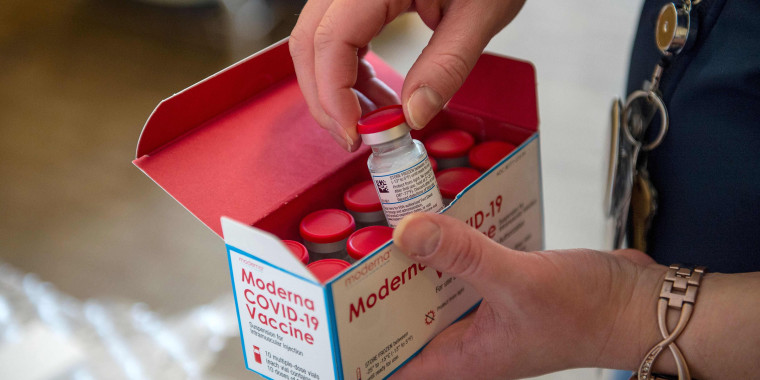When David MacMillan and a friend were perusing a grocery store in Washington, D.C., on New Year's Day to pick up some items to cook a quiet dinner, he was offered an opportunity many Americans are anxiously awaiting: to get vaccinated against COVID-19.
The 31-year-old law student told TODAY he was passing by the pharmacy section when he noticed a pharmacist speaking to an older woman about whether she wanted to receive the Moderna COVID-19 vaccine that very moment. The customer looked "hesitant" and "confused" and eventually declined, MacMillan said, which was when the pharmacist turned to him and his companion.
MacMillan recalled her asking, "Hey, I have two doses of the Moderna vaccine. They're going to expire, and I'm going to throw them out at the end of the day, and we close in 10 minutes. Do you want them?"
MacMillan said he was "ecstatic" at the prospect and agreed. The whole process, including paperwork and monitoring for possible adverse reactions, took 15 minutes, he estimated. He said he developed mild symptoms for a few days afterward, including a headache and sore arm, similar to how he feels after a flu shot. He's already scheduled to get his second dose later this month, he added.
The D.C. health department confirmed to TODAY that the city's policy is "zero waste of the vaccine. Pharmacists should follow our guidance. If doses will expire due to missed appointments, they should administer the vaccine to anyone who wants to take it."
Time constraints around vaccine usage
Across the country, there are people like MacMillan, who happened to have access to a COVID-19 vaccine despite not being in one of the priority groups, which are determined by state. Many of the people who've been vaccinated at this stage are health care workers. But federal officials are expected to start recommending that states allow everyone 65 and older or with underlying health conditions to receive the COVID-19 vaccine, the Centers for Disease Control and Prevention said Tuesday.
Even before access to the vaccines became less restricted, from Northern California to Connecticut, there have been reports of lower-priority individuals getting vaccinated to prevent doses from going to waste. This can occur due to storage issues or if someone doesn't show up to their appointment. There are time constraints around when the doses must be used after the vial is opened. Moderna's vaccine has 10 doses in a vial, while Pfizer's has five to six, Judson Howe, president of Adventist Health (a faith-based health care system based in the West Coast and Hawaii) in Mendocino County, California, told TODAY.
Storage challenges can arise because both types of vaccines must be kept cold and then reach room temperature prior to administration, Dr. Bessant Parker, chief medical officer of Adventist Health in Mendocino County, told TODAY. The Moderna vaccine is viable for six months when it's stored in a freezer between -15 and -25 degrees centigrade, but it can stay at regular refrigerator temperature for 30 days. When it reaches room temperature, it must be administered within 12 hours.
Pfizer, on the other hand, requires ultra-cold storage at -70 degrees centigrade, but it can stay in a refrigerator for five days, Parker said. Once it's out of the fridge, it needs to be used within six hours.
Last week, U.S. Health and Human Services Secretary Alex Azar recommended that states start vaccinating lower priority groups if they have doses that would otherwise just sit in a freezer. "Faster administration could save lives right now, which means we cannot let the perfect be the enemy of the good," he said.
How health officials and hospital staff are preventing waste
Adventist Health's Ukiah Valley Medical Center in Northern California encountered a problem with vaccine storage last week, which led to a rush to give out 830 doses. On Jan 4. around 11:30 a.m., Parker and Howe said they were notified that one of the facility's freezers broke, and hundreds of doses of the Moderna vaccine had been sitting at room temperature since 2 a.m.
The local health department's recommendation was to get them in as many people's arms as possible before they expired around 2 p.m., Howe said. The hospital gave 200 vaccines to the public health department, put in calls to local nursing homes and set up a clinic next to one of the largest local primary care providers, where staff had yet to be vaccinated. There were four pop-up clinics in total.

Parker estimated that more than 60% of the doses ended up going to members of the general public. Leslie Banta, a 56-year-old teacher who cares for her 92-year-old mother and whose husband has an underlying health condition, got vaccinated early thanks to Adventist Health's efforts.
"It was kind of a joyous atmosphere," she told TODAY. "People were really happy, really polite. There was no, 'I should get the vaccine and you shouldn't.'" She said she's expecting a follow-up call from the hospital to schedule her second dose.
'The clock is running'
Meanwhile, in Middletown, Connecticut, last week, 15 non-health care workers, including the mayor, were vaccinated to avoid throwing doses away, the city's acting health director, Kevin Elak, told TODAY.
"We didn't really expect that if there were people who called in sick or no shows, that we would have some vaccine left," he said. "Myself and the emergency management director ... said, 'OK we have these doses left over, the clock is running now. ... We don't want to discard these.'"
The doses all went to municipal workers, some of whom had underlying health conditions, Elak said, adding that community reaction has been mixed, which he attributes in part to Mayor Ben Florsheim, who is 28, being young and healthy.
"The bottom line is ... it's happening all over the country where doses were being discarded ... so no one wants to see that," Elak said. He also stressed that for every first dose given out, the state health department automatically sends the second, so future doses will not be taken away from other people. (Both the Moderna and Pfizer vaccines, the only two that have been authorized by the Food and Drug Administration, require two doses for full protection.)
In Nashville, Tennessee, two Subway employees were vaccinated against COVID-19 last week when a nearby health care facility vaccinating first responders was about to close for the day. A nurse noticed there were two extra doses, and no other first responders were scheduled or present, so another nurse brought over the two individuals, a local health official told TODAY.
Similar incidents have also taken place at long-term care facilities, in addition to hospitals and other health care settings, a rep for the National Center for Assisted Living, an organization that represents assisted living providers, told TODAY in a statement.
What does this mean for the public?
MacMillan, who posted of a video himself getting vaccinated on TikTok, said he's received comments telling him he "won the lottery" and others declaring their plans to wait in grocery stores in hope that they get the same opportunity. But at this stage, no states are vaccinating the general public, as priority is still being given to health care workers, people in longterm care facilities, older individuals, those with underlying health conditions and front-line essential workers, depending on where you live.
If you're eligible at this stage to get the vaccine but are struggling to access one, make sure you're aware of and signed up for notification systems for when there are extra doses, either through your employer or community. Elak said that Middletown has developed such a system, and Dr. Eric Cioe-Pena, an emergency physician at Northwell Health in New York City, told TODAY his hospital also has one.
Parker and Howe both stressed that when they were pressed to distribute hundreds of doses in mere hours, people were quick to move back in line if someone more in need arrived. And MacMillan had a similar mindset, he said.
"If (the pharmacist) hadn't said, 'Look, I only have 10 minutes,' there might've been a moment where I would've said, 'Well, isn't there someone else who needs it more than me?'" MacMillan recalled. "I figured if I can show I'm excited to get it, maybe other people will share that enthusiasm and be less suspicious, less hesitant."
